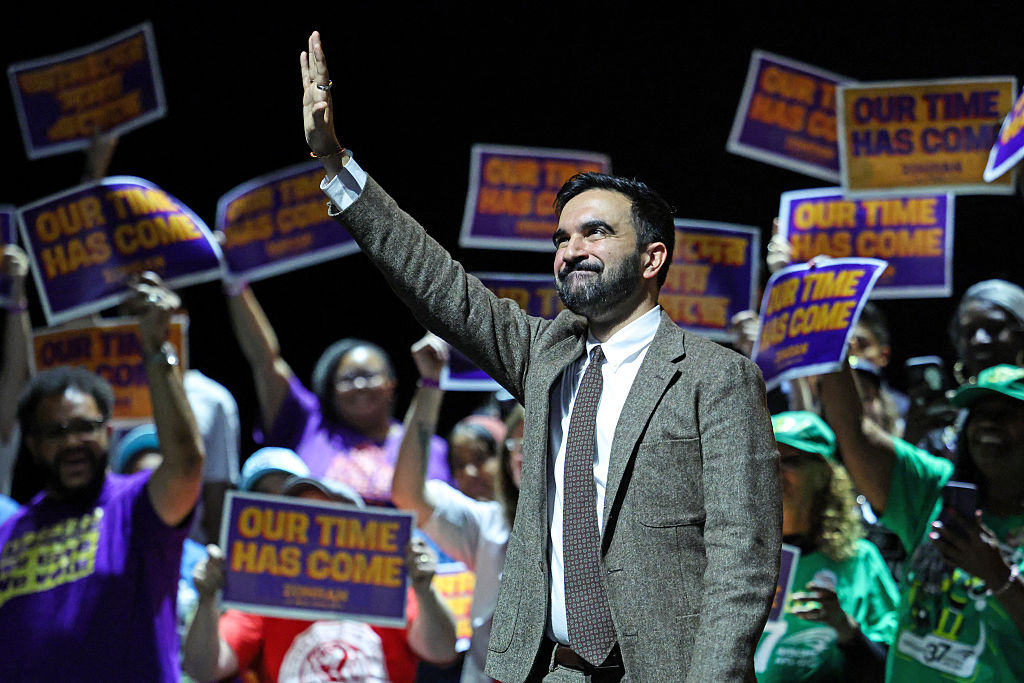A New Democratic Party, From the Gasping of the Old
The issue of Palestine speaks to a range of constituencies that Zohran Mamdani is trying to stitch together into a new coalition — and creates a cleavage with the establishment leaders of the Democratic Party like Andrew Cuomo and Chuck Schumer.

Palestine is an issue that crisscrosses the entire new electorate that Zohran Mamdani is hoping to fashion. (Charly Triballeau / AFP via Getty Images)
I finally had a chance to read that long Astead Herndon profile of Zohran Kwame Mamdani in the New York Times, which I recommend. I was especially struck by this passage.
Gaspard first met Mamdani in South Africa in 2016, at the premiere for “Queen of Katwe,” a Disney movie set in Uganda and directed by Mamdani’s mother, Mira Nair. Gaspard said the young man, just 24 at the time, showed flashes of the charisma that would later serve his entrance into politics. He compared the curiosity and demeanor of young Mamdani to that of — yes — Barack Obama. But Mamdani’s is a story that, like that of many other first-generation immigrants, doesn’t fit neatly into American political conventions like the two-party system or our Black-white racial framework. A composite of multiple worlds: Indian, Ugandan, American, Muslim, New Yorker.
Many moons ago, after the first Bernie Sanders campaign, I wrote a piece for the Times on the rise of democratic socialism in America. What got my attention at the time was what Herndon emphasizes here: how the new generation of democratic socialists break, in all sorts of subtle ways, ways that are both local and global, with the nation-state. Here’s what I wrote:
Today’s young candidates of the left tell a story of personal struggle that meshes with their political vision. Mr. Obama did that — but where his story reinforced a myth of national identity and inclusion, the socialists’ story is one of capitalism and exclusion: how, as millennials struggling with low wages and high rents and looming debt, they and their generation are denied the promise of freedom.
The stories of these candidates are socialist for another reason: They break with the nation-state. The geographic references of Ms. Ocasio-Cortez — or Ms. Tlaib, who is running to represent Michigan’s 13th District in Congress — are local rather than national, invoking the memory and outposts of American and European colonialism rather than the promise of the American dream.
Ms. Tlaib speaks of her Palestinian heritage and the cause of Palestine by way of the African-American struggle for civil rights in Detroit, while Ms. Ocasio-Cortez draws circuits of debt linking Puerto Rico, where her mother was born, and the Bronx, where she lives. Mr. Obama’s story also had its Hawaiian (as well as Indonesian and Kenyan) chapters. But where his ended on a note of incorporation, the cosmopolitan wanderer coming home to America, Ms. Tlaib and Ms. Ocasio-Cortez aren’t interested in that resolution. That refusal is also part of the socialist heritage.
Looking back, it’s clear to me now that I was writing more in the vein of a hope or a wish than accomplished fact. But I don’t think I was entirely off the mark either, for it seems that Mamdani is now fulfilling that vision.
It’s also why Mamdani’s position on Palestine is so important and resonant. Here’s Herndon:
“None of this works without him speaking up on Gaza,” said Gaspard, the former Obama administration aide, who likened it to Barack Obama’s opposition to the Iraq war before the 2008 presidential election. Gaspard has been a key figure connecting Mamdani with many of the city’s power players in the months since the primary, including Cardinal Timothy Dolan, the archbishop of New York.
For average people on the ground, having conversations in their barbecues or on their stoops, there’s a way that the issue of Gaza is a gateway to whether or not you can invite this political figure into your living room for a conversation about affordability or education or health care,” Gaspard said, citing new polling that shows growing disapproval of Israel’s actions among Democrats. “You don’t get to first base on the other things if you haven’t come out of the batter’s box on Gaza.”
It’s not just because Palestine is the latest issue du jour among the youth. As Herndon makes clear, it’s an issue that crisscrosses the entire new electorate that Mamdani is hoping to fashion — of immigrants, working-class people, many from South Asia, of Muslims, of students, of renters, of debtors, and more. Palestine doesn’t unite these constituencies or speak for all their concerns.
But it speaks to them, and in speaking to them, it is an issue that represents a cleavage between the new type of party that Mamdani is trying to create and the old party that Andrew Cuomo and Bill Ackman and Hillary Clinton and Chuck Schumer and Hakeem Jeffries are trying to hold on to.